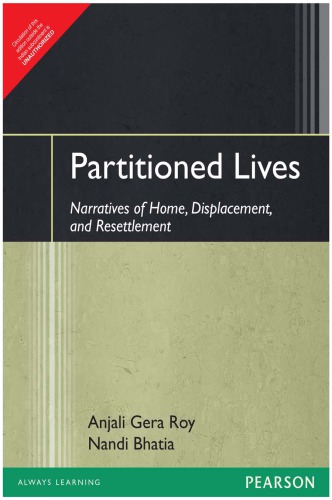

Most ebook files are in PDF format, so you can easily read them using various software such as Foxit Reader or directly on the Google Chrome browser.
Some ebook files are released by publishers in other formats such as .awz, .mobi, .epub, .fb2, etc. You may need to install specific software to read these formats on mobile/PC, such as Calibre.
Please read the tutorial at this link: https://ebookbell.com/faq
We offer FREE conversion to the popular formats you request; however, this may take some time. Therefore, right after payment, please email us, and we will try to provide the service as quickly as possible.
For some exceptional file formats or broken links (if any), please refrain from opening any disputes. Instead, email us first, and we will try to assist within a maximum of 6 hours.
EbookBell Team

4.1
60 reviews
ISBN 10: 8131714160
ISBN 13: 9788131714164
Author: Nandi Bhatia, Anjali Gera
secures their assurance of support towards evicting five of the families in the colony so that he can secure their land.When Arjun opposes the plan, one of Singh’s henchmen makes an attempt on his life. At this point, when Arjun is recovering from the attack two new characters are introduced—Arjun’s research supervisor and friend Abaneesh Mukherjee and his sister Shukla. Meanwhile hiring Dibya and a handful of other unemployed colony youth in his factory, Kewal Singh cunningly proceeds with his plans for expanding his business.Trusting Singh as their benefactor, the young men try to persuade the five families to fall in with his schemes and vacate the land. This leads to the schisms among the residents, and particularly, in a decline in Dibya and Arjun’s friendship. Unwilling to confront Arjun directly, Dibya satisfies his wrath by raping Labanya—a young woman from the colony attracted to Arjun. With the five families remaining obdurate, Singh abandons his attempts at persuasion and takes recourse to arson one night.The following morning he proceeds to consolidate his claim by building a wall around his newly-acquired territory. Arjun, finding the government and law enforcement ineffective, decides to dismantle the wall with the help of a small group of colony residents. Kewal Singh and his recruits—Dibya and other young men from the colony, Ratan, Sambhu, Nitai—resist them and, in the violence that ensues, Arjun is seriously injured. Recovering at the hospital he learns that his ‘guide’ Abaneesh has intervened and by generating media-attention compelled the government to register the land in the residents’ names. This marks the refugees’ final realization of Indian citizenship. This news and Shukla’s delicate admission of love rejuvenate Arjun. As a composite character, Gangopadhyay’s Arjun blends qualities from all the Pandava brothers of the Mahabharata. Like Sahadeva, he has a flair for learning. Like Arjuna, he has a good aim and is a self-described ‘archer’ (Gangopadhyay 1995: 53). His final violent encounter with Dibya is reminiscent of the Bheema–Duryodhana encounter at Kurukshetra (both the novella’s Arjun and Mahabharata’s Bheema strike their opponent on the thigh). It is arson that forces Arjun and his mother and brother to leave their homeland—the novella specifically mentions the famous ‘house of lac’ in connection with the burning down of their village home soon after his father’s death (ibid.: 23). Also, concentrating on a target—the eye of a falcon in a picture on a calendar in Shukla’s room—Arjun tells Shukla that he sees ‘Nothing except the eye of the bird’ (ibid.: 74), an answer identical to that Arjuna famously gave to his teacher Dronacharya’s identical query. Finally, just before the clash with Kewal Singh and his party (the Kauravas), Arjun, like his epic namesake, is overcome with reluctance towards attacking the other colony-men whom he considers his kinsmen. Dibya, like Arjun, is another composite character. He combines the traits of the Kaurava brothers in his growing rivalry with Arjun and his violation of Labanya for her impertinence. However, he most closely resembles Karna.This parallel is underscored when, on the eve of the confrontation, Arjun’s mother Shanti approache
Chapter 1
Transcending Religious Identities: Amrita Pritam and Partition
• Growing Up in Lahore
• 1947, Partition
• Today I call to Waris Shah
• I am the Cursed Daughter of Punjab from History
• Helplessness
• The Story of Punjab
• Divided
• Frenzy
• Pinjar: A Final Testimony
• Summing Up
• Notes
• References
Partition Makes the Nation
• History, Testimony, and Fiction in Representing Partition
• Towards an Ethnography of Partition Cinema
• Love, Martyrdom, and (in) Subordination—Shaheed-e-Mohabbat and Gadar: Ek Prem Katha
• Sikh Subjectivities and Partition Narratives: Some Conclusions
• Notes
• References
Chapter 3
The Diminished Man: Partition and ‘Transcendental Homelessness’
• Arjun in a Divided Maha-Bharata
• Arjun Homeless in the Modern World
• Conclusion
• Notes
• References
Chapter 4
Constructing Post-Partition Bengali Cultural Identity Through Films
• Films on the Partition of Bengal
• References
Chapter 5
Writing Partition: Trauma and Testimony in Bapsi Sidhwa’s Cracking India
• References
Chapter 6
Partition and Post-Partition Acts of Fiction: Narrating Painful Histories
• Notes
• References
partition of india stories
partitioned property
partition of house
narratives of home
partitioned lives
divorce partition of property
Tags: Nandi Bhatia, Anjali Gera, narratives, displacement